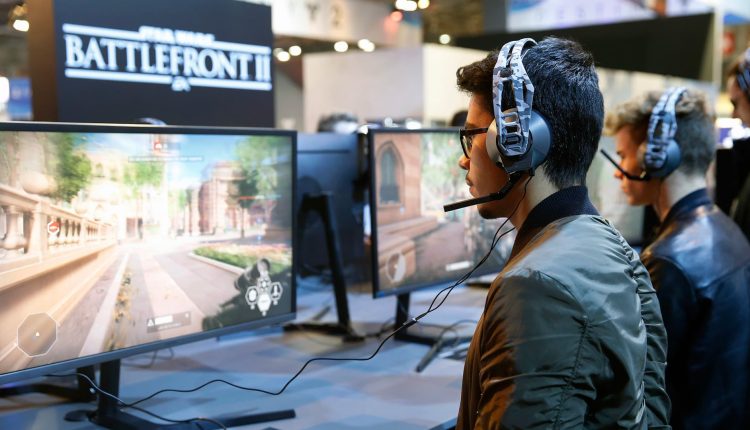Gamers play the video game “Star Wars Battlefront II” during the “Paris Games Week” on Oct. 31, 2017.
Chesno
Publicly listed gaming companies are sitting on a $45 billion pile of cash and cash equivalents — and that could lead to greater consolidation in the $188 billion video games market, according to a new report from venture capital firm Konvoy, which was shared exclusively with CNBC.
The likes of Activision Blizzard, Electronic Arts, Singapore’s Sea, Japan’s Nintendo and Bandai Namco, South Korea’s Nexon, and China’s NetEase, currently hold $45.1 billion in cash and cash equivalents, according Konvoy, which cited these companies’ latest public reports.
Public gaming companies currently hold cash and cash equivalents of $45.1 billion, according to a report from venture capital firm Konvoy.
Konvoy
That would give them more than enough financial firepower to look at potential acquisition targets that could help them build out their intellectual property and products.
In particular, gaming firms are looking to keep gamers more engaged for longer with live-service games that add more content over time and paid subscription packages that offer a certain amount of free games and access to cloud gaming, or the ability to play games via the cloud rather than downloading them to their machines.
Publicly listed gaming companies had a fairly rosy year in 2023, on the whole.
The VanEck Video Gaming and eSports ETF, which seeks to track MVIS Global Video Gaming & eSports Index, has climbed 20% in the year to date, according to Konvoy. The blue-chip S&P 500 index, by contrast, has climbed close to 12% year to date.
The performance of public gaming ETFs since the start of 2023.
Konvoy
The Global X Video Games & Esports ETF, which aims to track a modified market-cap-weighted global index of companies in video games and esports, hasn’t performed as well, slipping 0.4% since the start of 2023.
Big Tech eyes video games
Big Tech firms are also primed with plenty of cash to consider more gaming deals, according to Konvoy.
The VC firm said that the world’s biggest tech firms which includes Amazon, Microsoft, Google, Apple, Meta, Netflix, China’s Tencent, and Japan’s Sony, have a combined $229.4 billion of cash on their balance sheets to deploy on potential deals.
Josh Chapman, a partner at Konvoy, said the company expects the Microsoft-Activision deal — which saw the Redmond, Washington-based technology giant pay $69 billion for U.S. game publisher Activision Blizzard — would likely lead to further mergers and acquisition activity and create a new generation of gaming companies.
“As active gaming investors, we believe that gamers and gaming startups stand to benefit from the deal as it improves the value-proposition for gamers and leads to a vibrant M&A environment for other deals to get closed,” Chapman told CNBC in emailed comments.
Cloud gaming is a key area for Microsoft as it brings Activision into its growing portfolio of game publishers. The company is pushing its cloud gaming service, which does away with the need for traditional consoles likes its Xbox Series X or Sony’s PlayStation 5, with its Xbox Game Pass subscription product.
Chapman said this would lead to “new opportunities for emerging game developers, infrastructure companies and gaming platforms.”
Microsoft’s blockbuster acquisition of Activision Blizzard was approved by the U.K.’s Competition and Markets Authority earlier this month.
The deal, valued at $69 billion, will see Microsoft gain ownership of some of the most lucrative properties in video games, including the massive Call of Duty franchise, Candy Crush, Crash Bandicoot, Warcraft, Diablo, and Overwatch.
VC deal slump
Venture capital investment into video game firms slumped 64% year over year in the third quarter of 2023, according to Konvoy’s report.
Total venture funding into the video games industry in the third quarter of 2023 fell 9% quarter-over-quarter, to $454 million.
Konvoy
It’s a sign of how, despite the boost to the industry from Microsoft’s landmark deal, the boom times for the industry in 2020 and 2021 have ebbed.
Gaming startups raised a combined $454 million globally for the three months to September, down 9% quarter over quarter and more than 64% from the same three-month period a year ago.
Still, Konvoy’s Chapman anticipates the picture for gaming VCs and startups will look brighter next year, as grim venture investing conditions start to improve — however, funding for gaming firms has returned to a ” sustainable new normal” that will continue at the current pace for the next few years.
“As the global venture market rebounds we expect gaming, which was somewhat insulated from the initial impact of the economic downturn, to follow,” Chapman told CNBC. “We anticipate gaming VC funding to see a slight uptick over the next few quarters, when the industry will grow at a similar rate to before the pandemic.”
“Right now, VC deal volume and funding are comparable to pre-pandemic levels, and while we may not see the exponential growth of 2021, we’re excited to see a stable venture funding market in gaming for continued value creation in the industry.”
Tougher times
Video game publishers have been grappling with a deterioration of macroeconomic conditions, with high inflation and rising interest rates denting consumer appetite for discretionary spending.
Whereas in 2020, when consumers were flush with cash thanks to easy monetary conditions, times have gotten tougher in 2022 and 2023 as central bankers have increased interest rates in a bid to stem rising prices.
Still, the video game player base continues to increase, with a worldwide player base of 3.381 million today, according to Konvoy.
The video game market is still massive, and is projected to reach $188 billion in overall sales in 2023, according to Konvoy. That figure is up a modest 3% from the previous year, when gaming sales totaled $183 billion. But growth has accelerated slightly from 2022, when gaming sales rose only 2%.
That came after the standout year of 2021.
Gaming revenue reached $180 billion that year, climbing more than 8% from $166 billion in 2020 I assume, according to Konvoy’s research.
In 2020, the industry saw even bigger growth — more than 9% year over year. That was when pandemic lockdowns were in full swing, and people had more time to spend playing video games indoors.
Konvoy is projecting long-term growth for the games industry in the coming years, though. The firm said that it expects a compound annual growth rate of 9% in the next five years, with the industry reaching a whopping $288 billion in overall sales by 2028.
WATCH: Bandai Namco Entertainment discusses the success of ‘Elden Ring’

Read the full article here

